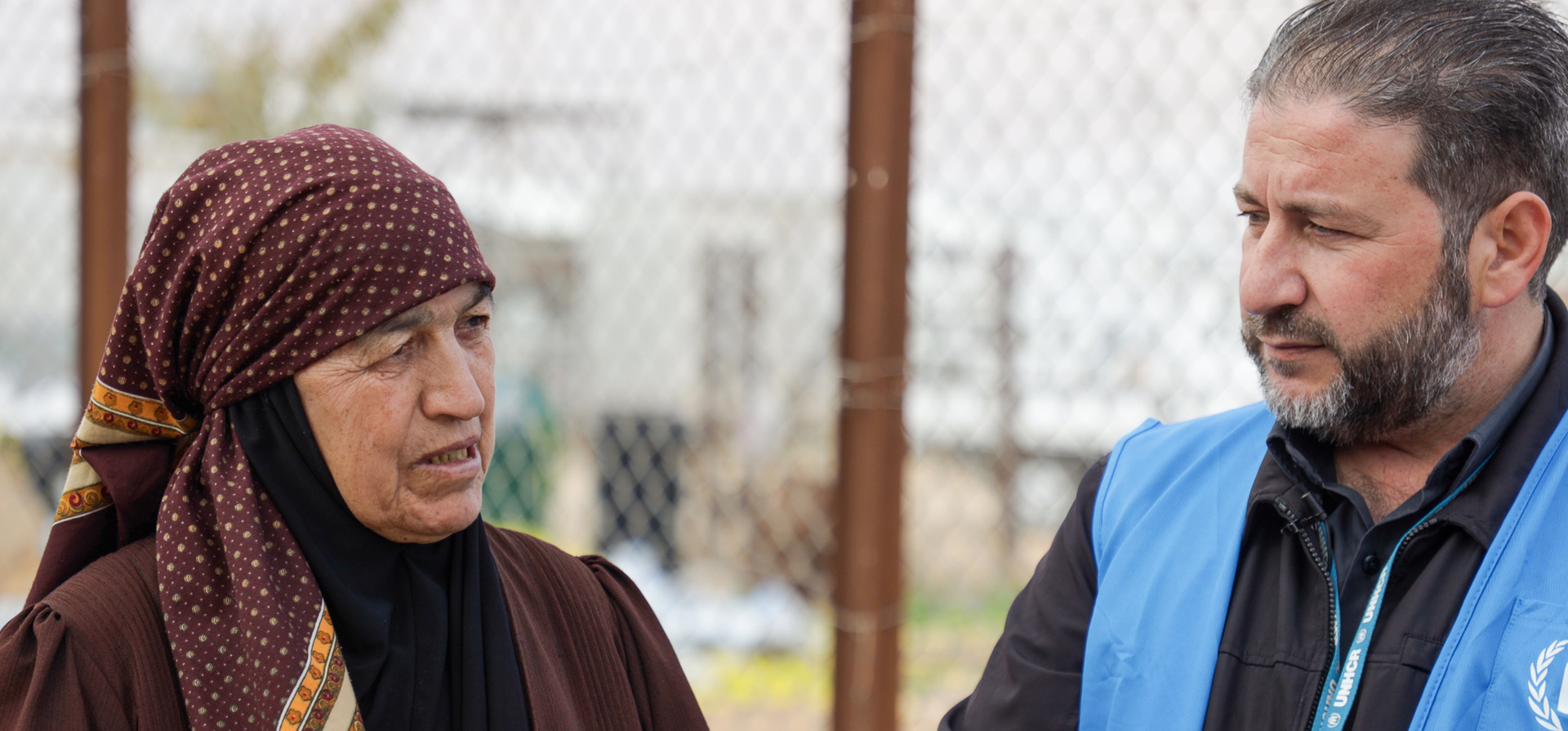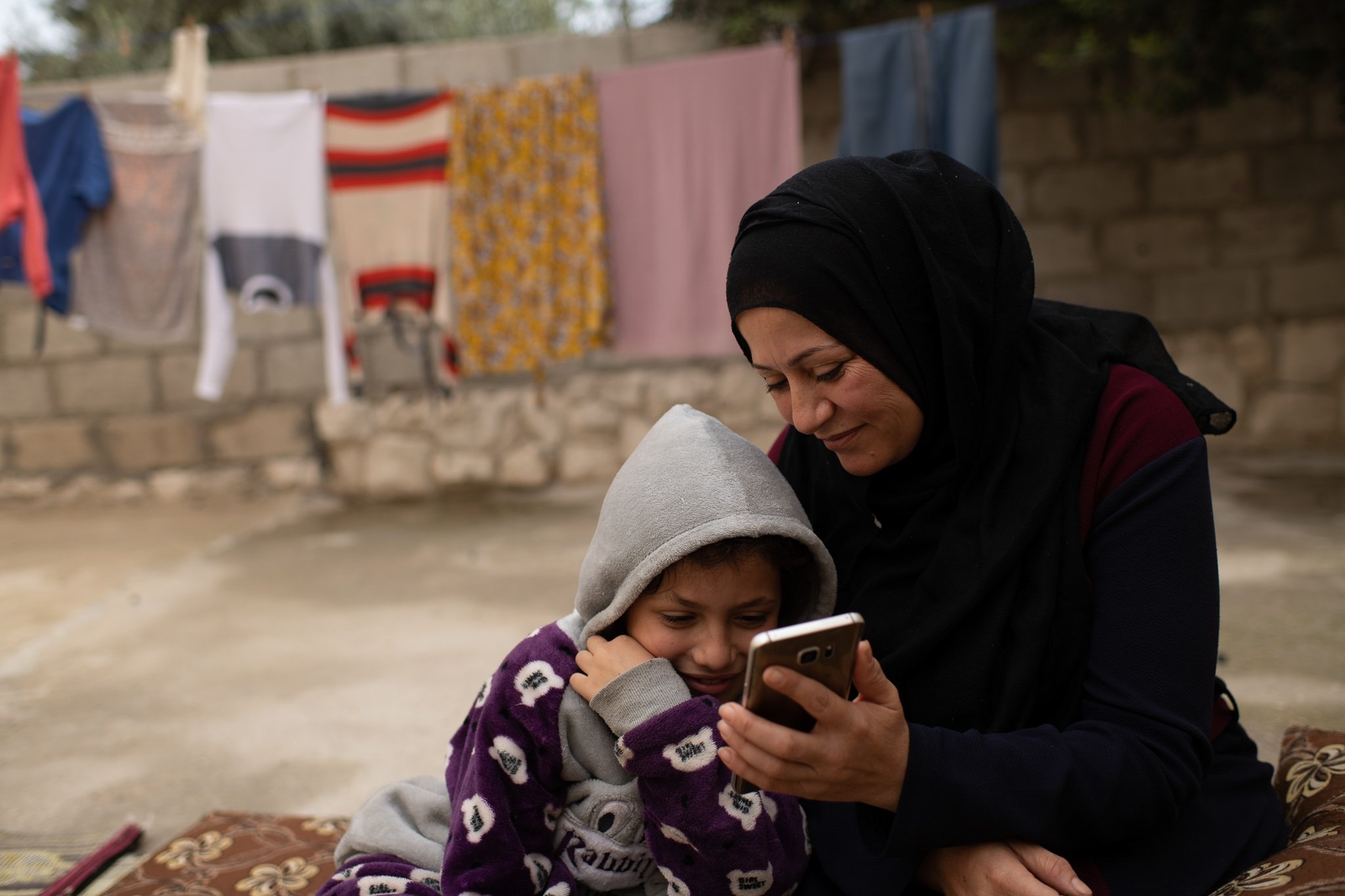Winter cash assistance helps refugee women across Jordan

Winter cash assistance helps refugee women across Jordan
From November until March, the weather in Jordan can be harsh. With temperatures sometimes dropping below zero, life is not easy for the more than 750,000 refugees registered with UNHCR.
This year, for Nawal, Shatha and Om Attala, UNHCR’s winter cash assistance has been a valuable lifeline. Thanks to the support of UNHCR Jordan’s donors, over 100,000 refugee families in Jordan living in both urban areas and refugee camps were assisted this winter through cash assistance distributions.
Nawal

Nawal, a Syrian refugee and single mother of five, receives an SMS that she will receive winter cash assistance from UNHCR. © UNHCR/Mohammad Hawari
As a 42-year-old Syrian widow, Nawal has lived in East Amman since 2013 after she fled from Syria to Jordan. A mother of five, she currently lives in a small, rented apartment. Since 2016, she has been the sole provider for her children after her husband passed away from cancer.
“My life turned upside down after he left us.”
In November, Nawal explained that she was worried about the approaching winter. Her apartment was damp, and water leaked through the roof when it rained. Her family was also in desperate need of a new gas heater. "Last winter, we only had a couple of blankets to keep us warm. My daughter Raneem gets sick fast from the cold, and I can’t afford extra expenses to treat her.”
Nawal’s family used to receive UNHCR’s monthly cash assistance, but it was cut off two years ago due to lack of funding. In 2020, she received UNHCR COVID-19 cash assistance to support her in her living expenses, but over the past year affording anything beyond the basics of rent, electrical bills, and medicine, has been a struggle.
On November 18th, 2021, at 11:45, though, everything changed. Nawal received an SMS from UNHCR stating that her family would receive winter assistance this year. “I can’t describe my feelings right now. Winter assistance will provide mercy for us.”
For Nawal, this has meant that she has been able to pay off old rental debts, buy medicine for her daughter and prepare for winter such as through purchasing gas refills for heating and carrying out the maintenance for her house to stop the water leakages which she had long wanted to do.
Shatha

Shatha, 35, receives winter cash assistance from UNHCR during distributions in Azraq Camp. © UNHCR/Lilly Carlisle
Around 20 percent of refugees in Jordan live in refugee camps. Located in the North-East of Jordan, Azraq Camp is known for its weather extremes, often reaching over 45 degrees in the summer and below zero in the winter. Shatha, a 38-year-old Syrian refugee, has struggled through these extremes for the last five years ever since she fled her home in Homs, Syria.
“My life was like heaven," she recalls describing her life back in Syria. There, she was surrounded by family members, but after becoming a refugee her life changed dramatically. In Azraq Camp, she is the sole caretaker for her elderly father and mother, as well as her brother who suffers from mental and physical disabilities.
With all these responsibilities, she has sacrificed much of her life for her family. "I rejected several marriage proposals so I could be able to help and support my very vulnerable family." But despite everything, she still believes it is an honor to help her family.
In winter, though, Shatha needs some extra help. Refugees in the camp live in small, metal prefabricated caravans which often flood or experience damage to their roofs due to heavy wind and rain. Shatha explains, “the camp is in the desert, and it gets really cold here, the weather is harsh and it's very hard to conduct daily life in the winter.”
Combined with the impact of the COVID-19 pandemic, Shatha has struggled financially because of limited livelihood opportunities. The need to find a job close to home, inside the camp, so she can continue to support her family also poses an extra challenge. “It’s hard to find the means to support my family with medicine, winter clothes, and slippers.”
In preparation for winter, UNHCR provided winter cash assistance to all refugees living in camps. Shatha’s family was one of them. With the money, she has refilled the gas cylinders for heating and bought winter clothes and medicine for her parents. “If we didn’t receive winter assistance this year, we would have struggled a lot.”
Om Attala

Fandia, 74, is a Syrian refugee living in Za\'atari Camp, Jordan. As a carer for her three grandchildren, she plans to use her winter cash assistance to buy gas for heating and warm clothes, during the cold season. © UNHCR/YousefAlHariri
Fandieh, or Om Attala as she is otherwise known, didn't expect to spend the latter years of her life as a refugee. But instead of enjoying her old age in peace, she is now one of the 80,000 Syrian refugees living in Zaatari Camp. A grandmother who has assumed responsibilities for her four grandchildren after they lost their mother in the war and whose father is still missing.
Despite all adversity, Om Attala is a woman with great spirit and personality who refuses to accept the hardships life has dealt. Always with a smile on her face, she graciously plays the role of mother and father for her grandchildren, mending their clothes, cooking their meals, and making sure they complete their education.
This year, UNHCR cash assistance helped her, help them.
“If I didn’t receive the assistance, I would be helpless. I received 230 JOD as cash assistance; 100 JOD was spent on caravan maintenance. We bought two wooden boards in order to seal the caravan’s roof and floor against flooding water. It also helped us to pay off some of our debts.”

